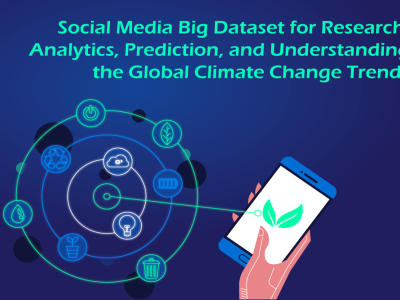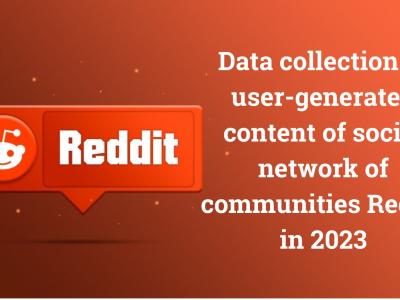Social Media Big Dataset for Research, Analytics, Prediction, and Understanding the Global Climate Change Trends

- Citation Author(s):
- Submitted by:
- Yuriy Syerov
- Last updated:
- DOI:
- 10.21227/71ms-8v86
 4404 views
4404 views
- Categories:
- Keywords:
Abstract
Social Media Big Dataset for Research, Analytics, Prediction, and Understanding the Global Climate Change Trends is focused on understanding the climate science, trends, and public awareness of climate change. The use of dataset for analytics of climate change trends greatly helps in researching and comprehending global climate change trends. By analyzing vast amounts of information gathered through social media platforms, researchers or users can gain valuable insights into the impact of climate change on different regions of the world to develop effective strategies for mitigating the effects of climate change and reducing its impact on our planet. The technology and data analysis can help researchers work towards more sustainable issues for future investigations.
This data set compiles a wide range of social media big data on climate change-related topics from a Reddit network of communities, including but not limited to greenhouse gas emissions, changing weather patterns, ocean health, sea levels, water scarcity, flooding, saltwater intrusion, wildfires, polar ice measurements, and their impacts on specific populations. The dataset has far-reaching implications for understanding and addressing climate change, spanning from public awareness and sentiment analysis to predicting climate-related events and informing policy decisions, making it a valuable resource in the fight against global climate change.
The dataset is a vital resource that contributes to our collective efforts in understanding, mitigating, and adapting to the impacts of climate change, ultimately working toward a more sustainable and resilient future for the planet.
The dataset provides data to:
- provide comprehensive and diverse data on climate change and its various aspects.
- support research efforts in understanding the science of climate change, assessing its impact on different domains, and developing solutions to mitigate its effects.
- make relevant climate change data accessible to facilitate research, analysis, and decision-making processes in the global fight against climate change.
- provide insights into the changing climate and its environmental impact.
- gauge public sentiment and awareness of climate change to track how people feel about climate issues over time, identifying shifts in public opinion.
- spread information and effectively tailor their awareness campaigns to target audiences, increasing climate change awareness and engagement by Governments, NGOs, and environmental organizations.
- predict climate-related events like extreme weather conditions, wildfires, or natural disasters, identify early warning signs, and improve disaster preparedness.
- help scientists and policymakers improve communication strategies to tailor messages more effectively by identifying common misconceptions and concerns in communication about climate issues.
- provide insights into how people's online behavior correlates with their attitudes toward climate change to encourage more sustainable lifestyles.
- better support and mental health resources for those dealing with climate-related stress and anxiety.
- identify influential voices and trends in the climate change conversation, inform their advocacy strategies, and help mobilize public support for environmental causes.
- assess the public's response to climate policies and initiatives to inform policy adjustments and help ensure climate policies align with public values and priorities.
- facilitate international collaboration on climate change issues to share data and insights, fostering a more connected and coordinated response to global climate challenges.
- develop engaging and informative content on climate change and educate students and the general public about the science, impacts, and solutions related to climate change.
- assess consumer sentiment regarding sustainable products and practices to inform business strategies and help organizations align with the growing demand for eco-friendly solutions.
- evaluate the effectiveness of climate change policies in different regions,
- assess public perception and compliance with policies to make data-driven policy recommendations.
The data provided in this dataset plays a crucial role in supporting global solutions to climate change in several ways:
- The data enables scientists and researchers to study climate change phenomena, identify trends, and make evidence-based conclusions about the state of the climate and its impacts.
- Policymakers can use this data to inform climate policies and regulations, facilitating informed decision-making at local, national, and international levels.
- The datasets offer valuable information for developing climate mitigation strategies, including promoting renewable energy, reducing emissions, and adaptation measures.
- Accessible data fosters public awareness and education about climate change, empowering individuals and communities to take action and make sustainable choices.
- Researchers from various disciplines can collaborate and leverage this diverse data to comprehensively address complex climate change challenges.
The dataset can be implemented and be helpful in various spheres and areas, particularly for research, analytics, prediction, and understanding of global climate change trends, climate change sentiment analysis, public awareness campaigns, predicting climate-related events, climate change communication, behavioral insights, climate change impacts on mental health, environmental advocacy, policy analysis, global collaboration, education and outreach, business decision-making, evaluating climate change policies, making it a valuable resource in the fight against global climate change.
Instructions:
This dataset consists of a wide array of 46 .csv and .xlsx files, each containing relevant data points and posts related to specific climate change topics. These datasets collectively represent a comprehensive and multidisciplinary resource for climate change research. The data is organized in a structured format, allowing researchers to perform in-depth analyses, conduct interdisciplinary studies, and draw insights that can inform climate change mitigation and adaptation strategies. This is the original dataset. The information gathered has been anonymized.
Datasets related to changing weather patterns, flooding, wildfires, tidal changes, coastal erosion, and sea level rise offer valuable information on the increasing frequency and intensity of weather-related events and highlight the ecological consequences of climate change. Dataset serves as a valuable resource for researchers, scientists, policymakers, and organizations working towards a better understanding of climate change phenomena and their implications for the environment and society.
Climate_Dataset.zip : This file contains the posts of users of social media networks (e.g., Reddit). Each post has 16 attributes: Date, Time, Post text, Post type, Flair, # upvotes, # comments, # awards, Post tone, Post URL, Community name, Community members, Years of membership, # Post Karma, # Comment Karma, # Awardee Karma.
The posts contain diverse communication and conversations that communicate user interests, perspectives of users, public opinion, reviews, feedback, suggestions, etc., related to climate areas.
Download and unzip into folders.
Files:
- Carbon emissions.csv: This file (~ 736 KB) contains 2359 posts.
- Carbon pollution.csv: This file (~ 326 KB) contains 990 posts.
- Changing weather patterns.csv: This file (~ 1315 KB) contains 4675posts.
- Clean energy solutions.csv: This file (~ 1145 KB) contains 4020posts.
- Climate.csv: This file (~ 894 KB) contains 3440posts.
- Climate activism.csv: This file (~ 272 KB) contains 908posts.
- Climate awareness.csv: This file (~ 266 KB) contains 938posts.
- Climate catastrophe.csv: This file (~ 260 KB) contains 816posts.
- Climate change.csv: This file (~ 865 KB) contains 2942posts.
- Climate crisis.csv: This file (~ 332 KB) contains 1116posts.
- Climate mitigation measures.csv: This file (~ 329 KB) contains 1024posts.
- Climate-driven conflicts.csv: This file (~ 49 KB) contains 193posts.
- CO2 emissions.csv: This file (~ 362 KB) contains 1124posts.
- Coastal aquifer salinization.csv: This file (~ 43 KB) contains 158posts.
- Coastal erosion.csv: This file (~ 71 KB) contains 251posts.
- Biodiversity loss.csv: This file (~ 113 KB) contains 362 pots.
- Drought monitoring.csv: This file (~ 70 KB) contains 269posts.
- Ecosystem resilience.csv: This file (~ 63 KB) contains 218posts.
- Emissions.csv: This file (~ 562 KB) contains 1937posts.
- Environmental sustainability.csv: This file (~ 78 KB) contains 287posts.
- Flooding.csv: This file (~ 2015 KB) contains 7415posts.
- Fossil fuels.csv: This file (~ 869 KB) contains 2835posts.
- Global climate change.csv: This file (~ 414 KB) contains 1349posts.
- Global warming.csv: This file (~ 1068 KB) contains 3909posts.
- Greenhouse gas emissions.csv: This file (~ 554 KB) contains 1661posts.
- Intergovernmental panel on climate change.csv: This file (~ 985 KB) contains 3255posts.
- Net-zero emissions.csv: This file (~ 156 KB) contains 481posts.
- Nitrous oxide emissions.csv: This file (~ 221 KB) contains 846posts.
- Ocean acidification.csv: This file (~ 155 KB) contains 513posts.
- Ocean health.csv: This file (~ 190 KB) contains 725posts.
- Ocean health acidification.csv: This file (~ 188 KB) contains 720posts.
- Paris agreement.csv: This file (~ 253 KB) contains 797posts.
- Polar ice measurements.csv: This file (~ 606 KB) contains 2206posts.
- Renewable energy.csv: This file (~ 919 KB) contains 3151posts.
- Saltwater intrusion.csv: This file (~ 58 KB) contains 216posts.
- Sea level rise.csv: This file (~ 1494 KB) contains 5271posts.
- Sea levels.csv: This file (~ 322 KB) contains 1082posts.
- Sea surface temperature.csv: This file (~ 526 KB) contains 1717posts.
- Specific populations.csv: This file (~ 404 KB) contains 1479posts.
- Sustainable energy.csv: This file (~ 314 KB) contains 1134posts.
- Temperature anomalies.csv: This file (~ 110 KB) contains 419posts.
- Temperature rise.csv: This file (~ 640 KB) contains 2083posts.
- Tidal changes.csv: This file (~ 140 KB) contains 555posts.
- Urban flooding.csv: This file (~ 120 KB) contains 486posts.
- Water scarcity.csv: This file (~ 162 KB) contains 592posts.
- Wildfires.csv: This file (~ 1216 KB) contains 4472posts.
The information was gathered using pre-defined keywords: biodiversity loss, carbon emissions, carbon pollution, changing weather patterns, clean energy solutions, climate, climate activism, climate awareness, climate catastrophe, climate change, climate crisis, climate mitigation measures, climate-driven conflicts, CO2 emissions, coastal aquifer salinization, coastal erosion, drought monitoring, ecosystem resilience, emissions, environmental sustainability, flooding, fossil fuels, global climate change, global warming, greenhouse gas emissions, intergovernmental panel on climate change, net-zero emissions, nitrous oxide emissions, ocean acidification, ocean health, ocean health acidification, Paris agreement, polar ice measurements, renewable energy, saltwater intrusion, sea level rise, sea levels, sea surface temperature, specific populations, sustainable energy, temperature anomalies, temperature rise, tidal changes, urban flooding, water scarcity, wildfires.
The value of Social Media Big Data for Research, Analytics, Prediction, and Understanding Global Climate Change Trends to the research community is significant and multifaceted. Here are some key ways in which this dataset can contribute to advancing climate change research:
- monitoring and analyzing real-time climate-related discussions and events as they happen so that immediacy can provide valuable insights into emerging trends and public reactions.
- gathering data from diverse geographic locations and cultures for understanding the worldwide impact and response to climate change.
- conducting a large-scale analysis to analyze trends, sentiments, and behaviors on a massive scale, providing a comprehensive view of climate change discourse.
- gauging public engagement with climate change issues to assess the effectiveness of communication strategies and tailor messages to resonate with specific audiences.
- developing a predictive model for climate-related events, such as extreme weather patterns, natural disasters, or disease outbreaks, that can aid in preparedness and response efforts.
- data can be integrated with other datasets, such as weather data, satellite imagery, and economic indicators, to facilitate interdisciplinary research for a deeper understanding of climate change's complex drivers and consequences.
- studying human behavior in response to climate change includes examining patterns of sustainable practices, climate advocacy, and the diffusion of climate-related information.
- assist in evaluating the impact of climate policies and initiatives on public perception and behavior to assess whether policies achieve their goals and make data-informed recommendations.
- integrating into early warning systems for climate-related events, helping to reduce the impact of disasters and protect vulnerable populations.
- developing educational resources and campaigns that effectively communicate climate science and encourage sustainable behaviors.
- shared access to social media data fosters a global network of experts working collectively to address climate change challenges.
- informing evidence-based decision-making by governments, organizations, and policymakers that provides valuable input for crafting climate policies that align with public sentiment and priorities.
Social Media Big Data for Research, Analytics, Prediction, and Understanding Global Climate Change Trends dataset offers a wealth of information that can enhance the depth and breadth of climate change research. It empowers researchers to gain real-time insights into public perceptions, behavior, and sentiment, ultimately contributing to more effective climate change mitigation and adaptation strategies.
This database is the basis for our research on understanding and addressing climate change, public awareness, and sentiment analysis to predict climate-related events. The study results will be published in a reputable peer-reviewed scientific journal.









In reply to well-structured dataset. good by Tania K
In reply to Understanding the impact of by Andriy M. Baraniuk